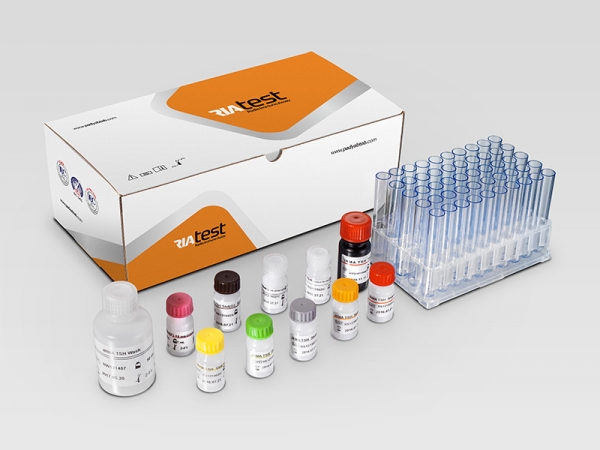| Name | TSH RIA Test |
| Full name | Human TSH RIA Test Kit |
| Category Name | Thyroid RIA kits |
| Test | 100 |
| Principle | Competitive Immunoradiometric assay |
| Detection Range | 0-50µIU/mL |
| Sample | 100µl Serum |
| Sensitivity | 0. 016µIU/mL |
| Total Time | ~450 min |
| Shelf Life | 45 Days from the manufacturing date |
TSH RIA kit description:
The Diagnostic Automation TSH RIA is intended for the quantitative determination of the thyroid stimulating hormone (TSH) concentration in human serum.
Materials provided with TSH RIA Test Kit:
1. Coated Tubes: Anti – TSH monoclonal antibody (100 tubes)
2. Anti – TSH monoclonal antibody Labelled with I 125 (Tracer I125)
3. TSH standard set, contains 0, 0.15, 0.55, 1.2,4, 15,50. µIU/mL, ready for use
4. Control serum: TSH in serum with preservatives(2Vial, 1 ml)
5. Washing Solution: PBS – T solution
Materials Required, not Provided:
1. Precision pipettes
2. Gama counter
Introduction
TSH (thyroid stimulating hormone) is secreted by the anterior lobe of the pituitary gland. It is a glycoprotein consisting of two chemically different subunits, alpha and beta which are combined together by non-covalent bonds. The α (alpha) subunit is nearly identical to that of glycoprotein hormones including human chorionic gonadotropin (hCG), luteinizing hormone (LH), and follicle-stimulating hormone (FSH). The β (beta) subunit (TSHB) is unique to TSH, and therefore determines its receptor specificity. TSH induces the production and release of thyroxine (T4) and triiodothyronine (T3) from the thyroid gland. The release of TSH is regulated by a TSH-releasing hormone (TRH) produced by the hypothalamus. The levels of TSH and TRH are inversely related to the level of T3 and T4 thyroid hormones. When there is a high level of thyroid hormone in the blood, less TRH is released by the hypothalamus, so less TSH is secreted by the pituitary. The opposite action will occur when there is decreased thyroid hormone in the blood. This process is known as a negative feedback mechanism and is responsible for maintaining the proper blood levels of these hormones. The determination of serum or plasma levels of thyroid stimulating hormone (TSH or thyrotropin) is recognized as a sensitive method in the diagnosis of primary and secondary hypothyroidism. High serum levels of TSH is seen in primary hypothyroidism due to thyroid dysfunction and secondary hyperthyroidism due to inefficiencies in the pituitary and also lower level of TSH serum is seen in primary hyperthyroidism and secondary hyperthyroidism, due to pituitary or hypothalamus anomalies.
Principle of the assay
Immune radiometric assay (IRMA) kit, evaluates TSH based on the one step-competitive reaction. The present TSH in the samples competes for attaching to the two mouse monoclonal anti-TSH antibodies in which one antibody is coated on solid phase (coated tube), the other, specific for the TSH and labelled with Iodine-125, is used as a tracer. Both of these antibodies react with TSH antigens which are present in standard, control serum and the sample. Unspecific materials are removed in the washing step. After incubation period, the reaction mixture of the tube is discarded and is washed and then the radioactivity is measured in a gamma counter. The amount of activity form in the tube has a direct relationship to the TSH concentration of the sample. TSH standards with known concentrations are tested with the unknown samples in which the concentration of unknown samples is achieved based on the standard curve of the counted amount against concentration of TSH.



